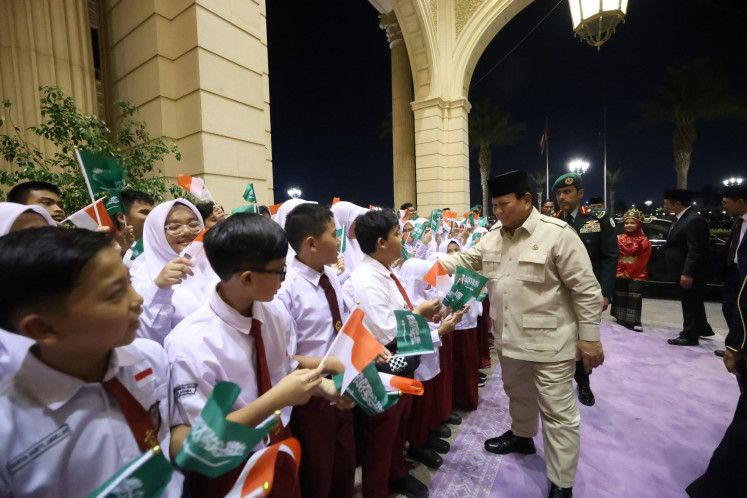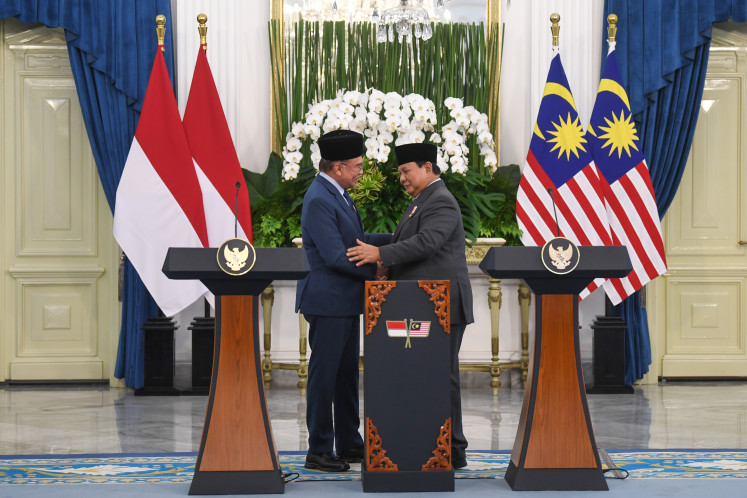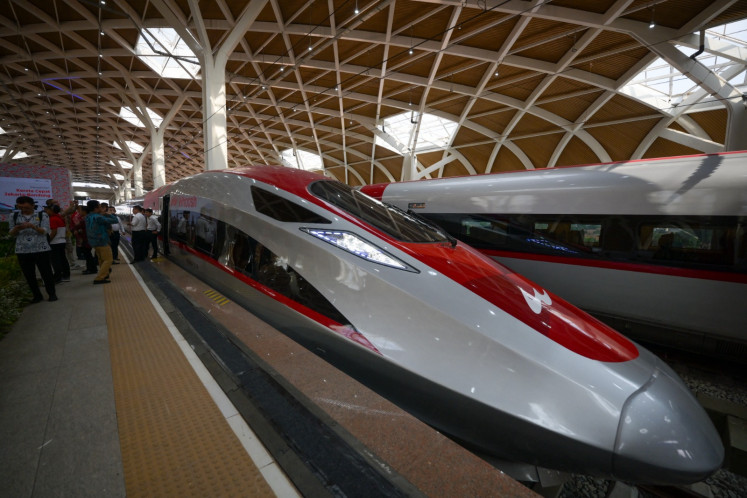Popular Reads
Top Results
Can't find what you're looking for?
View all search resultsPopular Reads
Top Results
Can't find what you're looking for?
View all search resultsManaging the holy noise pollution
A few weeks before Ramadhan 2015, Vice President Jusuf Kalla in his address to the Council of Indonesian Ulemaâs (MUI) meeting in Tegal Central Java, suggested that it was important that the external loudspeakers of mosques were regulated
Change text size
Gift Premium Articles
to Anyone

A
few weeks before Ramadhan 2015, Vice President Jusuf Kalla in his address to the Council of Indonesian Ulema's (MUI) meeting in Tegal Central Java, suggested that it was important that the external loudspeakers of mosques were regulated.
Additionally, Kalla has frequently said there is no 'divine reward' for amplifying recorded recitations through loudspeakers. Amplifying the adzan (call for prayers), recorded speeches, and Koranic recitation through speakers has only been a cultural symbol of Muslim communities.
Many Muslim leaders opposed Kalla's idea and even harshly accused him as being a provocateur. However, loudspeakers do need regulation for the sake of religious harmony ' based on my personal experiences living in the cities of Manado, North Sulawesi where Muslims are the minority, and in Padang, West Sumatra where non-Muslims are the minority group.
In Manado I used to live in a neighborhood of some 300 Muslim and Christian households in a Christian-dominated village. There was one mosque and three churches belonging to different Christian groups. The big one was a Minahasan (native Manado) mainstream church and the two others were Pentecostal churches. The mosque aired and amplified the call for five prayers and recorded Koranic recitations through loudspeakers.
The big church also often aired its mass, service announcements, hymns, and morning prayers several times a day, usually after 6 a.m. and 9 p.m. During Christmas and Easter seasons, church loudspeakers operated almost non-stop from sunrise to 11 p.m.
As the distance between the mosque and church was only 200 meters, the imam at the mosque would say prayer attendants found it hard to concentrate.
During the Christmas and Easter seasons, there were extravagant live events aired by the church. Most local Muslims kept complaining about the continuous noisy hymns, announcements, Bible recitations and sermons from the Pentecostal church but never spoke up about it with Christian neighbors.
The imam said he had complained about it to the church leaders but they seemed uncaring and kept airing the activities. He concluded that there was no benefit of complaining about such things to the local government as they think Manado is Minahasa land, a Christian ground.
Once during the Idul Adha (annual Muslim Day of Sacrifice), instead of hearing the customary worship of God (takbir) and other Islamic chants, mosque goers were forced to hear the live choir from the church.
In Padang, where my wife's family comes from, I used to live in a neighborhood of around 200 households. There were about five Christian families and one Balinese Hindu family. What was surprising was the way the mosque aired its adzan, sermons and children's activities.
Not only did the mosque compound have one loudspeaker; it had an extension in the public facility located 200 meters away, comprising a sports venue, a multifunction gazebo, a children's playground and green areas.
Surprisingly the volume of the speaker in the common area was even stronger than that surrounding the mosque. The adzan was aired at fixed prayer times but was preceded by 15 to 30 minutes of recorded Koranic recitation before the prayer times of dawn, noon and sunset. There was also a 15 to 30 minute sermon following the dawn prayer.
Apart from the Friday prayer and the sermon, children's religious activities were also aired through the loudspeaker.
Worse, sermons often touched on religious intolerance. One day the speaker warned Muslims about the significance of the devastating tsunami in Aceh and other natural disasters, relating it to increasing pornography in society.
On another day, the speaker talked about international conflict such as Palestine and Iraq, harshly criticizing non-Muslims. As a Muslim, I myself feel threatened by such reckless religious interpretations that went against my reasoning of my faith. During Ramadhan, the loudspeaker operated almost continuously from 3 a.m. to 10 p.m., often disrupting my baby's sleep
External loudspeakers of mosques and churches indeed have some benefits for people to engage in communal activities. In the past and in rural areas, they function very importantly as timers for both religious and non-religious activities.
In Manado and Padang, however, where loudspeakers function to blare the cultural existence of the dominant groups, regulations are needed to maintain the right of a group's expression as well as to protect minorities from the dominant group's interests. The regulation of speakers, however, should result from agreement between two or more related groups.
Finally, social integration will not be successful without the sincere integration of the minority groups with the dominant group. However a minority's integration will not happen without the majority group's acceptance.
Practically, the dominant group must provide a welcoming attitude to the minority by regulating their speakers' volume, frequency and timing so that it does not spoil the minority's comfort. In return, the minority groups would try wholeheartedly to integrate themselves with the rest of society.
_____________________________
The writer is a PhD student of Graduate School of Asia-Pacific Studies, Waseda University in Tokyo. He is a lecturer of State Institute of Islamic Studies IAIN Manado.









